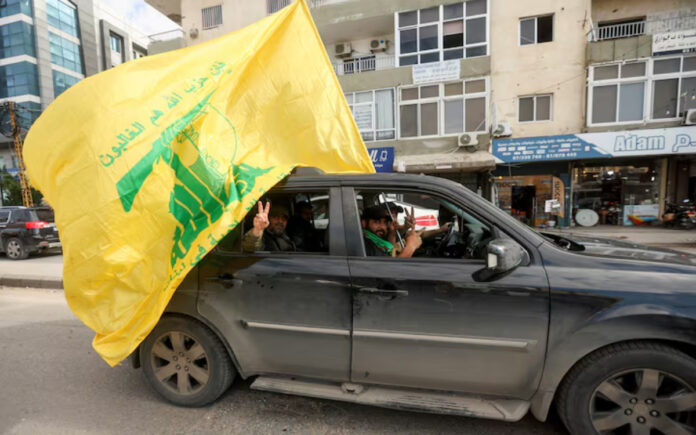Jerusalem: As domestic and international calls intensify for Hezbollah to disarm, a senior official from the group told Reuters it is prepared to engage in dialogue with Lebanon’s President regarding its weapons—if Israel withdraws from five strategic hilltops in southern Lebanon and ceases its ongoing strikes.
President Joseph Aoun, who took office in January with a stated aim of consolidating all weapons under state authority, is reportedly planning to initiate talks with Hezbollah about its arsenal, according to three Lebanese political sources.
The debate over Hezbollah’s weapons has grown more urgent following the group’s significant losses in the 2024 war with Israel, during which key leaders were killed, thousands of fighters lost, and much of its rocket arsenal destroyed. Hezbollah’s Syrian ally, former President Bashar al-Assad, was also removed from power, further shifting the regional balance.
A senior Hezbollah official stated that while the group remains open to discussing its arms within the framework of a broader national defense strategy, this willingness hinges on Israel’s full withdrawal from the disputed territory.
“Hezbollah is ready to discuss the matter of its arms if Israel withdraws from the five points, and halts its aggression against Lebanese,” the official said.
This marks the first time Hezbollah’s openness to such talks has been reported, although the sources requested anonymity due to the sensitivity of the matter. Hezbollah’s media office and the presidency both declined to comment when approached.
Israel, which deployed ground troops into southern Lebanon during the conflict, has mostly withdrawn. However, in February, it announced its intention to retain control of the five hilltop positions until the security situation permits a transfer to the Lebanese army.
Renewed Scrutiny of Hezbollah’s Arsenal
Despite a ceasefire in effect since November, Israeli airstrikes continue to target Hezbollah positions. The United States has also called for Hezbollah to disarm and is preparing for new nuclear negotiations with Iran, the group’s primary backer.
Hezbollah, long regarded as Iran’s most powerful proxy in the region, has seen its logistical links to Tehran disrupted by the collapse of Assad’s regime in Syria.
Reuters reported on Monday that, for the first time, several Iranian-aligned militias in Iraq have signaled willingness to disarm in order to avoid escalating tensions with the U.S. administration.
Within Lebanon, Hezbollah has consistently dismissed calls from opponents to disarm, arguing that its weapons are essential for national defense against Israel. In 2008, disagreements over its arsenal erupted into brief internal conflict.
Critics argue that Hezbollah’s military independence has undermined the Lebanese state and dragged the country into wars without consensus. A U.S.-brokered ceasefire deal stipulates that the Lebanese army dismantle all unauthorized military infrastructure south of the Litani River.
According to two individuals familiar with Hezbollah’s internal deliberations, the group is considering transferring some of its most advanced weaponry—such as drones and anti-tank missiles—to the army, but only in areas north of the Litani.
Pressure for a Disarmament Roadmap
President Aoun has insisted that Hezbollah’s arms must be addressed through negotiation, warning that attempts to forcibly disarm the group would lead to renewed conflict. Maronite Patriarch Bechara Boutros Al-Rai echoed this sentiment, stating that while all weapons must eventually fall under state control, this process must be diplomatic and gradual.
One Lebanese official confirmed that communication channels with key stakeholders are being opened to explore the “transfer of weapons” under a national framework, as Lebanon’s military and security forces extend state authority.
Also Read | New Trump Orders Clash with Climate Goals in Coal Boost Drive
Parliament Speaker Nabih Berri, a major Hezbollah ally, has also been involved in the process to mediate and reduce political rifts, the official added.
During a weekend visit to Beirut, U.S. envoy Morgan Ortagus reiterated Washington’s position that Hezbollah and other armed groups should be disarmed immediately and that the Lebanese army must take responsibility.
“It’s clear that Hezbollah has to be disarmed and it’s clear that Israel is not going to accept terrorists shooting at them, into their country, and that’s a position we understand,” Ortagus said in an April 6 interview with LBCI television.
Kamal Shehadi, a minister from the anti-Hezbollah Lebanese Forces party, called for a specific timetable for disarmament, suggesting that a six-month deadline could be feasible based on the country’s post-civil war disarmament model.
“Only a timeline can protect our fellow citizens from the recurring attacks that are costing lives, costing the economy and causing destruction,” he told Reuters.
The most recent flare-up began in October 2023 when Hezbollah launched attacks in support of Hamas at the start of the Gaza war.
Also Read | Seoul Responds to Trump’s Auto Tariffs with $10 Billion Rescue Plan
In a March 29 speech, Hezbollah leader Naim Qassem said the group no longer has an armed presence south of the Litani and has honored the ceasefire, whereas Israel has violated it “every day”. Israel, however, claims Hezbollah still maintains hidden military infrastructure in the south.
Hezbollah maintains that it is up to the Lebanese state to pressure Israel into halting its operations and withdrawing from contested areas. Qassem emphasized that diplomatic options remain on the table, but warned:
“The resistance is present and ready,” he said, hinting that the group could resort “to other options” if the current ceasefire agreement is not upheld.



